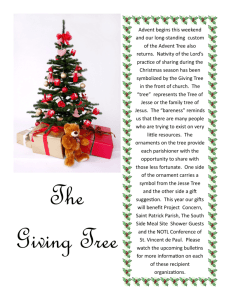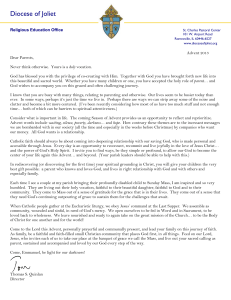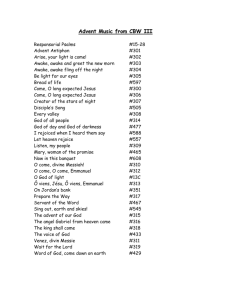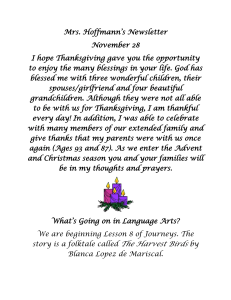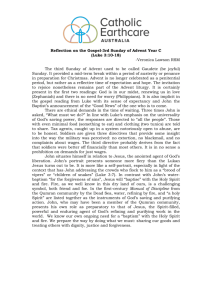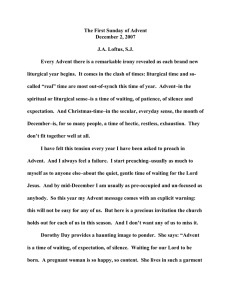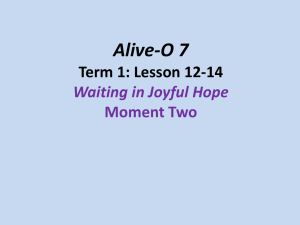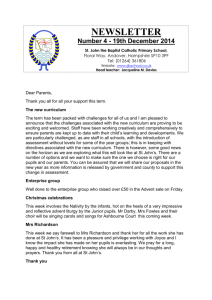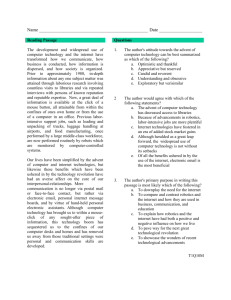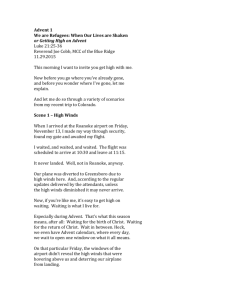Sunday 1 Advent 2015 - 3 Catholic Parish Kck
advertisement
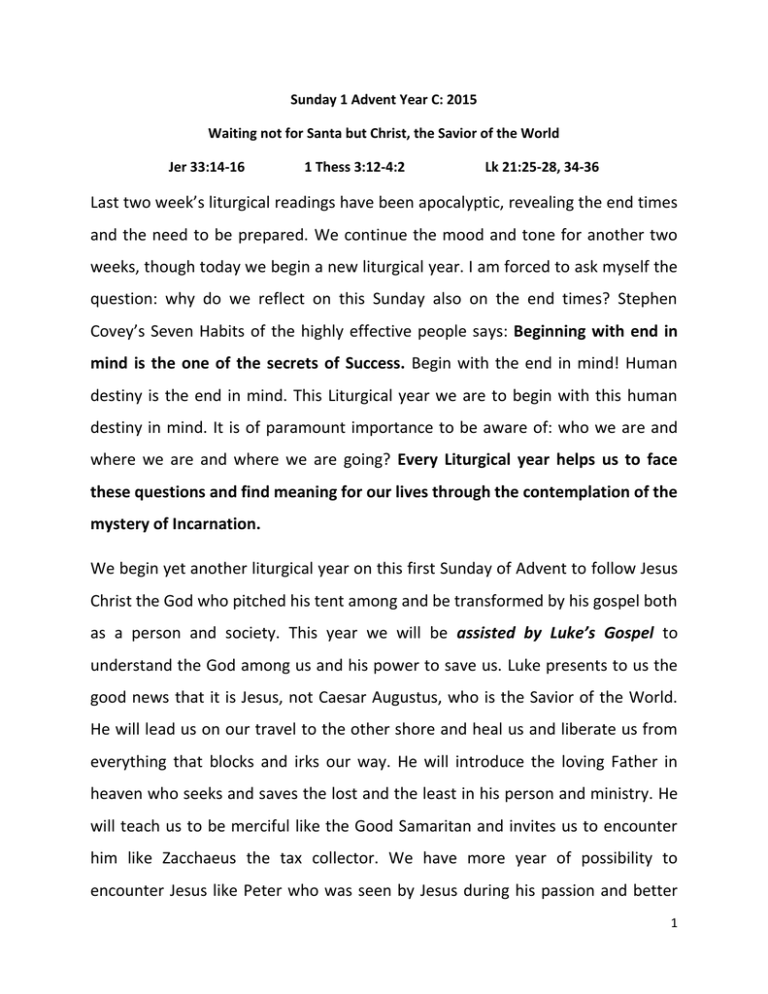
Sunday 1 Advent Year C: 2015 Waiting not for Santa but Christ, the Savior of the World Jer 33:14-16 1 Thess 3:12-4:2 Lk 21:25-28, 34-36 Last two week’s liturgical readings have been apocalyptic, revealing the end times and the need to be prepared. We continue the mood and tone for another two weeks, though today we begin a new liturgical year. I am forced to ask myself the question: why do we reflect on this Sunday also on the end times? Stephen Covey’s Seven Habits of the highly effective people says: Beginning with end in mind is the one of the secrets of Success. Begin with the end in mind! Human destiny is the end in mind. This Liturgical year we are to begin with this human destiny in mind. It is of paramount importance to be aware of: who we are and where we are and where we are going? Every Liturgical year helps us to face these questions and find meaning for our lives through the contemplation of the mystery of Incarnation. We begin yet another liturgical year on this first Sunday of Advent to follow Jesus Christ the God who pitched his tent among and be transformed by his gospel both as a person and society. This year we will be assisted by Luke’s Gospel to understand the God among us and his power to save us. Luke presents to us the good news that it is Jesus, not Caesar Augustus, who is the Savior of the World. He will lead us on our travel to the other shore and heal us and liberate us from everything that blocks and irks our way. He will introduce the loving Father in heaven who seeks and saves the lost and the least in his person and ministry. He will teach us to be merciful like the Good Samaritan and invites us to encounter him like Zacchaeus the tax collector. We have more year of possibility to encounter Jesus like Peter who was seen by Jesus during his passion and better 1 experienced the power of that look of Jesus and wept bitterly and got transformed. Truly this is a year of great expectations! Soon we will be in December! December is the month of Winter Solstice, the longest night in the year, it is the month of long dark nights and silky silent days. The humanity waits patiently for coming of the Spring, for the coming of the light and the warmth. This is true not only just astronomically, but also of the world today, as it is plunged deep into darkness of despair and hopelessness, fear and intimidation, waiting to the coming of the light and the warmth, hope and supportive accompaniment. December’s long dark night is driven away by the light in the arrival of the life and light in the spring. We wait for that in December with a joyful expectation. Liturgically we call that season of waiting with joyful expectation as Advent. Advent is the spiritual season of waiting for the Savior who can lead us out of our personal and social darkness into his life enhancing light. Thus Advent instills in us hope, the faith-filled expectation of the better future. In this season of fall, we also at times feel perplexed and fear whether our life too will be like the leaves that fall from the trees and carried away in the gusts of wind. We know that the trees put on new leaves in the next spring and they wait for that. But what’s about us? Will we disappear and will be gone? What will be our destiny? This Advent reminds us the need for the savior, who can lead us to the definitive destiny. Advent reminds us the truth that God incarnates to stay with us and to accompany us to reach the lasting destiny. Advent is the waiting season for the coming of that God who journeys with us. The mystery of Incarnation is about God’s desire to relate with us. Liturgical year helps us to grow 2 in that relationship and get out of the darkness of fear and anxiety; perplexity and despair. What distinguishes the waiting of the believer from every other waiting; from, for example, that of the two characters who are waiting for Godot? In that play a mysterious person is awaited (who, according to some, would be God, hence, "God-ot"), without any certainty that he will really come. He was supposed to come in the morning; he sends word to say that he will come in the afternoon. In the afternoon he does not come, but surely he will come in the evening, and in the evening, perhaps tomorrow morning. … The two tramps are condemned to wait for him, they have no other alternative. This is not how it is for the Christian. He awaits one who has already come and who walks by his side. The Liturgy of the Word asks us to wait for the coming of that God with hope and joy in vigilance and prayer. God is the best security and the final assurance. Jeremiah in the first reading offered hope to the people of Judah right before the Babylonian exile. Zedekiah, their king was not faithful to the covenantal relationship with YHWH and he relies on the political power for protection, not on the power of God who is faithful. God will keep his promises to the house of David. He will raise a just shoot and shall do what is right and just in the land. The future king will not be like Zedekiah. In those days Judah shall be safe and secure. This promise is fulfilled only in the coming of Jesus Christ. In the reading from Thessalonians, Paul exhorts the believers that they are to prepare and pray for the coming of the Lord by making more and more progress in holiness in both personal and community lives. In the Gospel Jesus says in his eschatological discourse that those disciples who make no preparations for the coming the Son 3 of Man will be shaken in their foundations with fear and anxiety but those who make preparations need to hold their heads high, because their liberation is at hand. They need to be vigilant and praying. Hence the message for us on this first Advent Sunday is: God longs to relate with us to lead us out of darkness that surrounds us. Nothing can be compared to the security and the assurance he can give us. We have the great possibility to the better days ahead. We can only wait for the coming of God patiently with faith and expectation. We are to wait watching and praying with falling into the traps. This season of Advent is meant for this. Advent is about the coming of the savior. It is not about the Santa’s coming. Advent is about preparations and not about the purchases. Keep primary, primary and secondary, secondary. Coming of the Savior will heal our wounds, fill our emptiness and grant us ease and calm. Unfortunately we fall trap to the market world and anticipate the Christmas. We cannot wait. We get distracted and get busy with shopping, decorating the houses with lights and Christmas trees. Waiting is hard. We think we are in control. We are important and center of the universe. It is hard for us to accept that God is in control and we cannot do much except to wait for him to arrive. Let us have patience. Let Advent be advent. Let us take up activities that help us to live the spirituality of Advent, a spirituality of waiting and contemplation. Some of the activities that can be suggested are: Make an advent wreath and light the candle in the evening saying: come Lord, Jesus. 2. Find time to read a promise of God a day. 3. Place the Nativity Scene in the prominent place in the house and meditate on that. 4. Take up the spiritual and corporal works of mercy. 4 The Spiritual works of mercy: Bearing wrongs patiently, praying for the living and the dead, admonishing sinners affectionately, counsel the doubtful, instruct the ignorant, forgive the offenses, and comfort the afflicted. The Corporal Works of Mercy: these kind acts by which we help our neighbors with their material and physical needs: feed the hungry; give drink to the thirsty; clothe the naked; shelter the homeless; visit the sick; visit the imprisoned; bury the dead. Fr. Mariadas Sesetti msfs. 5
